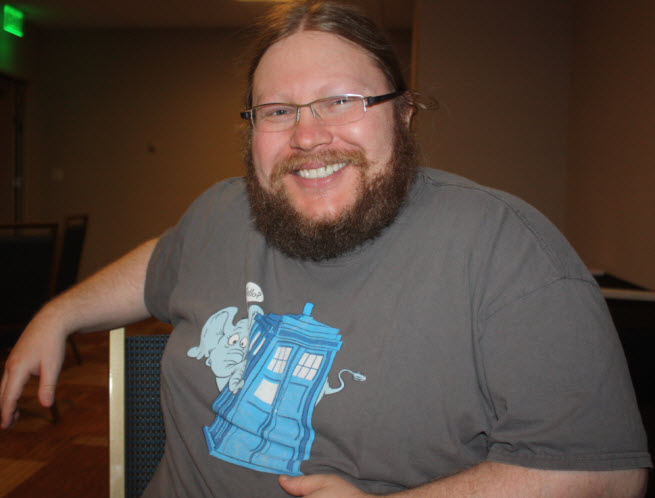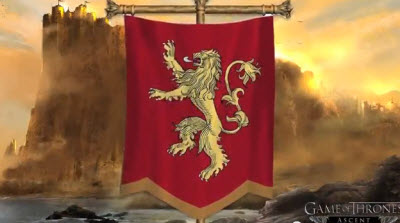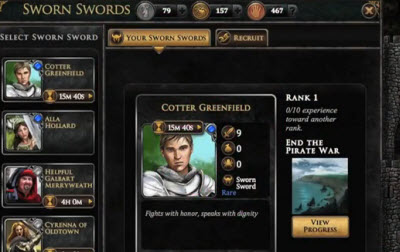GamesBeat: Is it a case in which people play the game to talk about the show? When The Hobbit came out, a lot of people joined the Kabam game, even though they had played the same game before multiple times on different platforms. They just wanted to talk about The Hobbit. In this case, they want to talk about the Red Wedding.
Radoff: That certainly happens. Our players talk to each other. I’m well aware that our customers are using the game as a platform for conversation. But unlike The Hobbit, which was kind of a reskin of Kingdoms of Camelot or however far you want to go back, we genuinely have some unique, novel gameplay. We’re doing things with dialogue and character interaction that have been done in the triple-A game space but haven’t been tried in this format before. They haven’t been socialized before. That’s driven a lot of retention for the type of players who enjoy our gameplay.
GamesBeat: How might you get to a bigger scope given that the show is already on such a large scale? Is there anything more you can do get more people to notice Ascent?
Radoff: For us, it’s going to more platforms. Players want to choose where and how they play a game. We can’t dictate that. A certain part of the market is happy to play a web-based game, but ultimately the larger part of the market is the tablet market. We’re going there next. That’ll open up the product to many more people who wouldn’t have otherwise played it – people who don’t want to be attached to a social network and whatnot. That’s our growth strategy.
We designed the game for people who are fans of Game of Thrones. If you’re not a Game of Thrones fans, could you enjoy the game? Maybe. I’m sure some people have learned about Game of Thrones by playing our game. But it’s primarily for people who are already fans and want to extend that experience into a game. Fortunately, in the case of Game of Thrones, that’s a lot of people. We don’t even know – 15, 20, 30 million people have watched the show in one way or another. So we’re going to more platforms first.
GamesBeat: What is it that keeps players coming back?
Radoff: They have so many things to do in the game, starting with the quests. We have 2,000 or so quests in the game. That’s a lot of content. There’s almost always something to do.
What’s interesting about the universe, for our type of game—I’m a big believer that certain types of worlds are right for certain types of games. Games in an adventure format, where there’s the big, bad evil guy and you have to navigate dungeons and stuff to eventually get there, that’s not what Game of Thrones is. Game of Thrones is very character-driven. It has a wide cast of characters and a lot of moral ambiguity. It’s not like there’s one bad guy and you’re done.
For is, that meant it’s perfect for politics and diplomacy and playing the role of a person within that world and trying to make an impact in it, having consequences behind your actions. Social games, in a lot of cases, don’t take advantage of social technology as a way to innovate in gameplay. Most social games use social technology as a marketing mechanism – get your friends to help you build something. But it hasn’t changed the type of gameplay you’re involved in.
What we’re trying to do with story—If you think of these dialogue-driven quests, it’s almost like a Choose Your Own Adventure book. With social gameplay, the neat thing you can do with that is, you and I are passing the book back and forth between each other. I make a choice and it impacts you. Now you have the choice and it comes back to me. You can do a lot of neat things with that. We see narrative and story as a wide-open space for innovation in social games.
GamesBeat: Does something like The Walking Dead give you some inspiration that way?
Radoff: The Telltale game? Their game came out after ours was relatively baked in terms of where we were going, but I like a lot of what they’re doing as well. They have a lot of the same things to say that we do in terms of the importance of narrative and the ability to push the envelope with that.
The big difference is that they’re a single-player experience. With the types of stories you tell there, the emotional engagement you get is a more direct response to the story and how you travel through it. Our type of innovation is around the socialization of the story and the fact that we impact each other. My emotions are almost directed more toward you than the story itself, although our writing is very good as well. We have a lot of actual BioWare writers on our game, people from Star Wars: The Old Republic.
GamesBeat: Other social games like Game of War: Fire Age have been built as a messaging engine with a game on top of it. Those games provide many ways for people to communicate. That seems maybe a little relevant to what you guys do. It’s not necessarily the game itself that’s the attraction. Instead, it’s talking about the subject matter.
Radoff: Talking about the subject matter, but also just facilitating interesting social interactions between players, in almost a role-playing sense. It’s not enough to make the social exchange be something like a gifting mechanism or a hurdle to get to the next stage of gameplay. Those mechanisms were driven more by viral marketing efforts.
GamesBeat: The Zynga sorts of things.
Radoff: Yeah, the Zynga stuff. That doesn’t work anymore, or it doesn’t work well enough to be something you want to focus on. The big untapped space is just getting people to interact. I’ll give you an example. In our game, players can marry each other. You go through a negotiation. You decide if you want to be married to another person. It’s not an NPC; it’s an actual person playing the game. That’s just one example. You can betroth your children, backstab each other, get in all kinds of trouble. It’s Game of Thrones. [Laughs]
The idea is to engage you in a story where your decisions have consequences: the consequences extend beyond the personal impact on you. It also impacts other people, so you can get this interesting dynamic exchange going.
In our game, guilds are important as well. We call them “alliances” to be a little bit more Game of Thrones-y as far as the theme goes. People participating within alliances are very important. That’s another area we continue to develop – what more can we do at the alliance level of interaction, to bring them into conflict or cooperation with each other and craft stories around that?
GamesBeat: How large is the company now? What will you do next?
Radoff: We have 19 employees. The company’s about 3.5 years old now. We’re working on some other things – nothing we can talk about yet. Game of Thrones is the focus of the company right now. We have a couple more platforms we want to be on and more features we want to add. It’ll keep us busy for quite a while.
Beyond that, our strategy – at least for the next few years – is to focus on licensed intellectual property that gives us that fan base that comes in and enjoys the game. We want to take risks on gameplay innovation. When you’re designing a game, there’s an awfully long list of risks you can take. If we’re going to risk things on gameplay, we don’t also want to be taking risks on the universe and user acquisition and things like that. In the long term, hopefully we’ll be able to do more things as well, but that’s what you’ll see from us next – other licensed worlds in different genres, like science fiction.
VentureBeat's mission is to be a digital town square for technical decision-makers to gain knowledge about transformative enterprise technology and transact. Learn More



